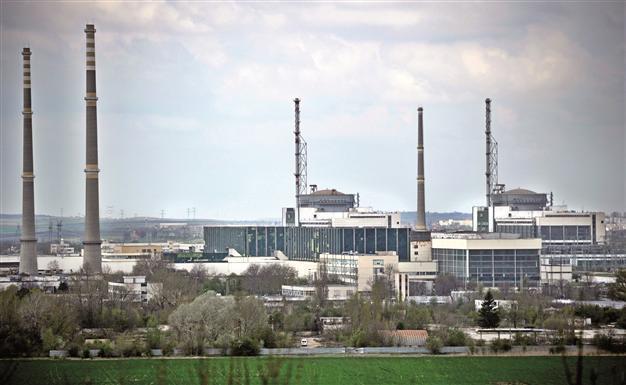Turkey hopes $7.2 billion gas bill cut with nukes
ISTANBUL - Anatolia News Agency

This file photo shows a general view of Bulgaria's only nuclear power plant near the town of Kozloduy. AFP photo
Turkey plans to cut $7.2 billion from its annual natural gas bill after the planned nuclear plants are online in the next decade.“Our power needs will double in the next decade. Now we have been importing 72 percent of our energy needs, but we will not need to import one-third of our current natural gas imports when our nuclear plants are online, saving $7.2 billion annually,” Prime Minister Recep Tayyip Erdoğan said.
Turkey’s power consumption has doubled in the last decade, having been increased from 130 billion kWh to 240 billion kWh.
Turkey’s nuclear power strategy constitutes one of the basics of its long-term strategy to decrease its energy dependence. Turkey aims to build a local nuclear industry over the next decade as it seeks to cut reliance on costly imported oil and gas, although Turkey outsourced its first two atomic power plants to foreign firms.
“Maybe we will build our third nuclear plant with our local [human] resources. We have already started to train our engineers and other workforce in this regard,” Erdoğan said during the opening ceremony of an event organized by the Ministry of Industry in Istanbul yesterday.
Turkey made a $22 billion deal with a Japanese-French consortium to build its second nuclear power plant in the Black Sea province of Sinop last week. The construction of the first nuclear plant was handed to a Russian company, Rosatom, which plans to begin operations in Mersin-Akkuyu by 2019.
Safety risks considered
According to the latest nuclear plant agreement, Japan promises to set up Turkish vocational colleges and universities to provide nuclear training. Under the deal with Rosatom, 100 students each year are to be trained in Russia. The program has attracted over 5,000 applications for the positions this year.
Many governments around the world have started to rethink their nuclear strategies after the Fukushima disaster in Japan two years ago. Of the 63 nuclear power plants currently being built worldwide, 39 are being built in non-OECD countries, including 26 in China, 10 in Russia and seven in India, according to the World Energy Outlook 2012 report by the World Energy Council.
“Safety measures will be applied at maximum levels, considering the lessons from unfortunate nuclear plant accidents, lately in Fukushima,” Erdoğan noted. He said there was always a risk, even if it is one in a million, with such projects but such risks can be minimized using scientific breakthroughs and the latest technologies.
















